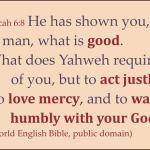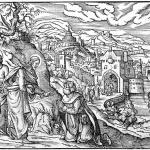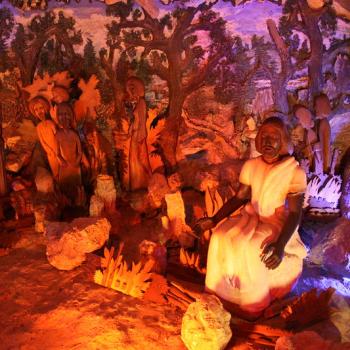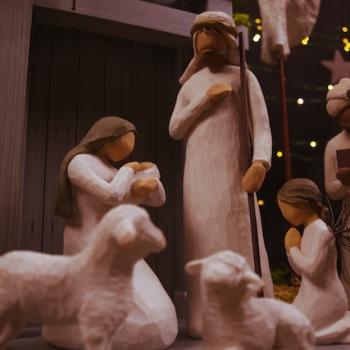
“If you had faith the size of this mustard seed, you could say to this mulberry tree, ‘Be uprooted and planted in the sea,’ and it would obey you.” (Luke 17:6)
Really, Jesus?
Those words repeated themselves in my mind as I perused the lectionary. Really?
The disciples ask Jesus to increase their faith, and he tells them that if they had any faith at all, even the most minuscule sliver, they could do extraordinary things like uproot trees and replant them in the sea. But as preposterous as this notion is, it doesn’t disturb me nearly as much as what he says next.
“Who among you would say to your slave who has just come in from plowing or tending sheep in the field, ‘Come here at once and take your place at the table?’ Would you not rather say to him, ‘Prepare supper for me, put on your apron and serve me while I eat and drink; later you may eat and drink?’ Do you thank the slave for doing what was commanded?’
So you also, when you have done all that you were ordered to do, say, ‘We are worthless slaves; we have done only what we ought to have done!’”
Really, Jesus?
Is Jesus, who came to show us our infinite worth in the eyes of God, really telling us to call ourselves “worthless slaves?”
This isn’t just disturbing; it’s dangerous. Deadly interpretations of passages like these have left their bloody fingerprints all over history, from crusades to genocide to slavery.
I can’t take these words at face value, but neither can I ignore them.
In the context of Jesus’ subversive ministry, servant leadership, and solidarity with the poor and condemned, there is much more to these words than meets the eye.
As I wrestled with this baffling, bothersome passage, I finally wrenched out a blessing to share: “Be who you are meant to be, a reflection and instrument of Love, and all will be well.”
You already have all the faith you need.
What could it mean to have faith that uproots trees or moves mountains?
What is the context of this teaching, which too often has been abused to shame any sort of doubt?
Jesus has just told his disciples that they should avoid being a temptation to others, rebuke sin, and forgive indefinitely, even when repentance seems… hard to believe. Rather than grumble about the practicality or feasibility of this, the disciples ask Jesus to increase their faith, presumably in order to do what he commands.
I think that’s commendable. But perhaps Jesus thinks they’re stalling, because they already have all they need.
“You don’t need any more faith. Any faith at all makes the seemingly impossible possible.”
Jesus is telling the disciples that they already have within them all they need to live as he is instructing. And that instruction is to reject sin and live in abundant forgiveness.
Don’t worry about how much faith you have. Just do it.
But what is faith?
“If you had faith the size of this mustard seed…”
I would agonize over statements like these as a child, because I didn’t think I had faith. Certainly, I couldn’t believe in literally moving mountains or mulberry trees. I couldn’t even be certain of salvation for myself or my loved ones, because I couldn’t really know if God was there. Faith, as I understood or misunderstood it, didn’t come naturally.
What did come naturally? Anxiety and doubt, but also concern and compassion. The desire for the wellbeing of my loved ones. Empathy for anyone who might find themselves worrying, as I did, what all of this could mean. As I scolded myself for not having faith, I found myself sympathetic to the failings of others. Forgiving mistakes of others usually came easily, because as I wrestled with my own insecurities, I constantly felt the need for forgiveness. How could I withhold from others what I myself longed for?
I recognize all of this, now, as manifestations of Love within me.
Maybe that’s what faith is after all?
Maybe faith is living into who we are as reflections of God, who is Love. Maybe faith is letting the Love in which we are made shine through.
Maybe faith isn’t a commodity that can be increased or decreased, but living into the very core of our being. Maybe faith comes subconsciously, like breathing, just from existence, from living in an interconnected world where we depend upon and derive our understanding and purpose from one another.
What if we discard our anxiety about having “enough faith” and instead use our skills and talents to serve each other, to the best of our ability, according to the principles of justice, kindness, and humility?
What if, even while we are skeptical or doubtful or fearful, we act according to the inner voice of Love, not because we know everything will be okay but in spite of not knowing, because the more we listen to Love the more impossible it becomes to do anything else?
What if that’s what faith is?
Jesus turns the tables.
Recognizing “faith” as living according to the Love within us is crucial to understanding the rest of what Jesus says. Because living according to the Love within us makes rebuking sin, forgiving others, and even uprooting mulberry trees (or deeply-rooted systems of oppression), possible.
“Who among you would say to your slave…”
Jesus is setting up a bait-and-switch. He speaks to a worldview that devalues the dignity of enslaved people, a perspective that turns human beings into utilities. He also makes the disciples tell on themselves, to show that they are complicit with this worldview. If they had slaves, they would make demands without thinking of the slaves’ needs and comfort.
It’s the nature of the slave to serve, and it’s the nature of the master to command.
Right?
But now, as he so often does, Jesus turns the tables.
“So you also, when you have done all you were ordered to do, say, ‘We are worthless slaves; we have done only what we ought to have done!”
What if Jesus is deliberately subverting the notions of slavery and worthlessness by putting the disciples in a position of solidarity with those whose worth they might not be able to see?
Jesus himself is already in such solidarity. Jesus is the revelation that God, the Creator and Sustainer of all things, is Love. And Love takes the form of a servant to the vulnerable, the poor, the condemned, the “least.” Jesus will go on to tell his disciples that anyone who wants to be great must become a servant. And then he will call his followers, his “servants,” friends.
Jesus breaks down the binaries between slave and master, between servant and friend, and even between human and God. If it was thought that humans were made to serve God, what do we make of a God who serves us?
What if slavery, violence, oppression, dehumanization, sin in all its hideous and insidious forms, is the tree that faith can uproot?
And what if we already have that faith within us, in our very essence, because we are made in the image of God, vessels of Love?
With Love, all things are possible.
I want to take another look at the lectionary passage through a lens of Love, but backing up to get a fuller view.
Again, Jesus has warned his disciples to avoid and not lead others into sin, but to rebuke sin and forgive people. “Sin” sums up acts and systems of oppression and injustice. Calling out such acts and systems (rebuking them) rather than acquiescing to them exposes their violence. Forgiving the people involved breaks the cycles of resentment and vengeance which sustain the dehumanization at sin’s root.
All of this is exactly what Jesus will do on the cross. If the disciples follow Jesus’ instructions, they will transform sin, live abundantly, and empower others to follow.
This is where the lectionary begins. But avoiding sin is hard, rebuking sin takes courage, and forgiveness requires the strength to overcome resentment and see the humanity in those who do inhumane things. The disciples ask Jesus, “Increase our faith!”
But Jesus says,
You already have enough faith. You are made in the image of Love.
Nurture the Love within you, and even if it starts out as tiny and insignificant as a mustard seed, it will grow and empower you to do extraordinary things.
Jesus goes on to show a worldview that assumes it’s the nature of the slave to serve the master. Power structures of masters and slaves don’t think of the slave’s comfort or needs, or even humanity at all. The slave serves. It’s not a question of faith or worthiness. According to a worldview of domination and subordination, slaves serve because of who they are.
But when the master is Love, when we serve Love, the whole power structure of master and slave breaks down.
Love doesn’t enslave but empower.
Love doesn’t subordinate but befriend.
Love serves us even while teaching us how to serve others.
And when we live according to Love, we will see Love everywhere, in the eyes of everyone, neighbor and enemy, friend and stranger. Temptations to power and greed lose their grip on us when we know the suffering they will cause our fellow human beings, fellow Love-bearers. The courage to rebuke oppression and injustice, to turn from our own instances of it and call it out in others (friend and foe alike), increases. And the ability to forgive, to overcome resentment and see the human through the inhumanity, strengthens.
Love transforms us from the inside out and empowers us to transform a world of injustice.
It’s not even about serving Love. It’s about being Love.
Conclusion
At the very core of our essence, we are Love. We don’t need to increase our faith, because faith is simply living according to the Love that we already are.
We are not worthless slaves in a system of domination, but instruments of Love made for joy and compassion and mutual service. But once we know who we are in Love and as Love, all anxiety about worthiness dissolves. Worthiness has nothing to do with Love.
And the mountains of fear that hinder us? The deeply-rooted systems of violence and dehumanization that entangle us? We are already empowered to move and transform them. Because Love can do all things, and together we are the Body of Love.












